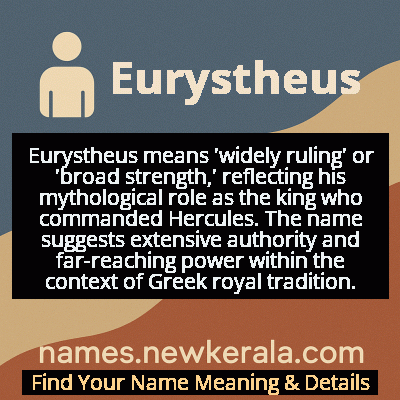Eurystheus Name Meaning & Details
Origin, Popularity, Numerology Analysis & Name Meaning of Eurystheus
Discover the origin, meaning, and cultural significance of the name EURYSTHEUS. Delve into its historical roots and explore the lasting impact it has had on communities and traditions.
Name
Eurystheus
Gender
Male
Origin
Greek
Lucky Number
8
Meaning of the Name - Eurystheus
Eurystheus means 'widely ruling' or 'broad strength,' reflecting his mythological role as the king who commanded Hercules. The name suggests extensive authority and far-reaching power within the context of Greek royal tradition.
Eurystheus - Complete Numerology Analysis
Your Numerology Number
Based on Pythagorean Numerology System
Ruling Planet
Saturn
Positive Nature
Ambitious, efficient, realistic, and authoritative.
Negative Traits
Materialistic, stressed, confrontational, and can be overly ambitious.
Lucky Colours
Dark blue, black.
Lucky Days
Saturday.
Lucky Stones
Blue sapphire, amethyst.
Harmony Numbers
2, 4, 6.
Best Suited Professions
Business leaders, managers, financial services, law enforcement.
What People Like About You
Leadership, determination, organizational skills.
Famous People Named Eurystheus
Eurystheus of Mycenae
Mythological King
Commissioned the Twelve Labors of Hercules
Eurystheus (Historical Reference)
Ancient Ruler
Documented in classical historical texts as a significant Mycenaean monarch
Eurystheus in Drama
Theatrical Character
Central figure in lost Greek tragedies exploring power dynamics with Hercules
Name Variations & International Equivalents
Click on blue names to explore their detailed meanings. Gray names with will be available soon.
Cultural & Historical Significance
In Greek cultural context, Eurystheus symbolizes the bureaucratic and administrative aspect of kingship contrasted with heroic physical prowess. His relationship with Hercules explores themes of legitimate versus earned authority, as Eurystheus holds the throne by birthright while Hercules earns immortality through labors. This dynamic reflects Greek societal values about different forms of excellence and leadership. The enduring cultural significance of Eurystheus lies in his role as the essential counterpoint to Hercules' heroism, demonstrating how opposition and challenge can become the very means through which legendary status is achieved.
Extended Personality Analysis
Individuals associated with the name Eurystheus typically exhibit strong organizational skills and a natural aptitude for leadership, though they may prefer administrative roles over direct action. They tend to be methodical, cautious decision-makers who value established systems and procedures, often serving as guardians of tradition and convention. Their personality combines strategic thinking with a certain rigidity, making them excellent at planning and delegation but sometimes resistant to spontaneous innovation. They possess a strong sense of duty and responsibility, which can manifest as stubbornness when their authority is challenged.
In interpersonal relationships, those named Eurystheus often project an image of authority and competence, though they may struggle with personal risk-taking. They excel in positions where they can direct others' talents and maintain order, but might be perceived as overly conservative or hesitant to embrace change. Their leadership style tends to be more about maintaining stability than pioneering new frontiers, reflecting the mythological Eurystheus' role as the established king who commands rather than performs heroic deeds. This personality profile suggests someone who finds strength in structure and tradition, serving as the necessary foundation upon which more dramatic achievements can be built.
Modern Usage & Popularity
In contemporary times, the name Eurystheus remains exceptionally rare and is primarily confined to academic circles, classical studies, and mythological enthusiasts. It has never gained significant traction as a given name in modern Greek or international naming conventions due to its strong association with the mythological antagonist and its complex pronunciation. The name occasionally appears in historical fiction, fantasy literature, and creative reinterpretations of Greek myths, but its usage as an actual personal name is virtually nonexistent. Current trends show no indication of rising popularity, as parents generally prefer Greek mythological names with more positive associations like Apollo, Orion, or Athena. The name's modern relevance is largely academic and cultural rather than practical in naming contexts.
Symbolic & Spiritual Meanings
Eurystheus symbolizes the essential role of opposition in personal and heroic development. He represents the concept that challenging figures and difficult circumstances are often the catalysts that force growth, resilience, and ultimate achievement. Symbolically, he embodies the bureaucratic and administrative aspects of power - the ruler who commands from a position of authority rather than demonstrating physical prowess. This reflects the important truth that different forms of strength and leadership exist, and that organizational power can be as influential as physical heroism. The name also carries symbolic weight regarding fate and free will, as Eurystheus was both a pawn of divine manipulation and an active agent in shaping legendary outcomes, representing the complex interplay between predetermined destiny and individual choice in human achievement.

